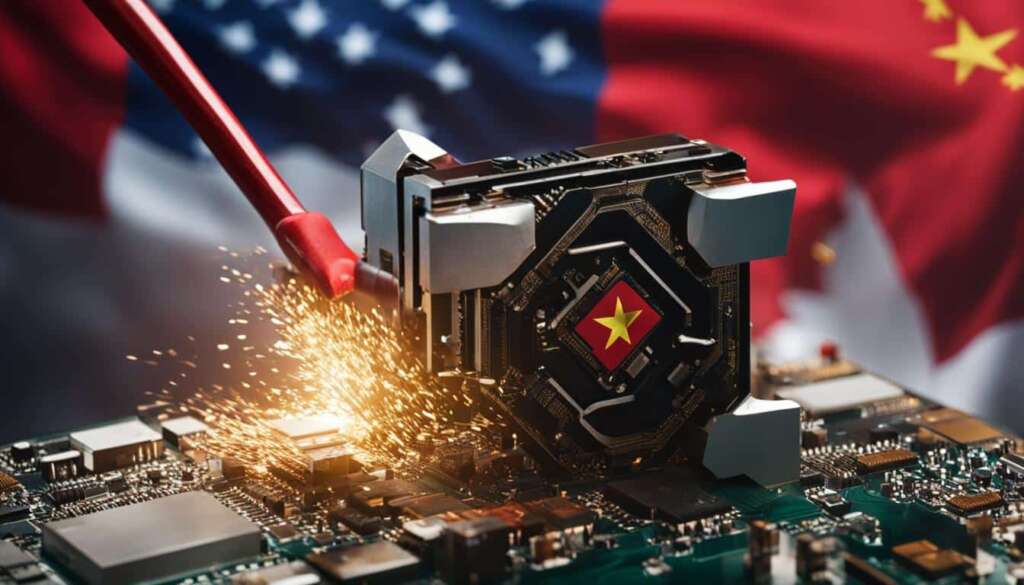Table of Contents
The U.S. Department of Commerce has recently announced its plans to impose restrictions on the sale of advanced artificial intelligence chips to China. These new rules aim to close loopholes that have emerged after previous restrictions on AI chip exports. As a result, companies like Nvidia, a leading U.S. chip manufacturer, may face significant challenges. The restrictions will not only impact Nvidia but also other chip manufacturers and Chinese chip suppliers.
These restrictions could potentially trigger economic retaliation from the Chinese government against U.S. firms. The implications of this move extend beyond the business sphere, as it may further strain the already tense U.S.-China relations. The impact on the AI chip market and the semiconductor industry as a whole remains uncertain. It is crucial for companies in the industry to adapt and find alternative markets amidst the changing trade landscape.
Nvidia and the Impact on Chip Manufacturers
Nvidia, as one of the leading chip manufacturers, will undoubtedly be affected by the new restrictions imposed by the U.S. Department of Commerce. While the company has stated that the restrictions will not have an immediate material effect on its earnings, they could pose long-term challenges to its operations. The impact will not be limited to Nvidia alone, as other chip manufacturers such as Intel and AMD will also need to navigate the changing landscape of the semiconductor industry.
These restrictions come as part of the ongoing trade war between the U.S. and China, with both countries looking to secure their technological dominance. Intel, one of the major players in the chip industry, may face challenges as well, as it is heavily involved in semiconductor manufacturing equipment. The trade war and subsequent restrictions create an uncertain environment for all chip manufacturers, as they navigate the complexities of global trade and changing regulations.
As the U.S. government aims to prevent Chinese access to advanced semiconductors for military use, Nvidia and other chip manufacturers may need to reassess their strategies and explore alternative markets. The loss of the Chinese market, which has been a significant driver of demand for AI semiconductors, could have far-reaching implications for the industry as a whole. The semiconductor industry, known for its rapid advancements and innovations, will need to adapt and find new avenues for growth in the face of these restrictions.
Nvidia’s Position
Despite the potential challenges posed by the restrictions, Nvidia has expressed confidence in its ability to comply with all applicable regulations. The company expects minimal near-term impact on its financial results due to strong global demand for its products. However, it does acknowledge that the development and release of new products may be affected. Nvidia has already released alternative chips that comply with existing export controls, demonstrating its proactive approach in addressing potential obstacles.
While the future outlook for AI chip exports and the U.S.-China trade relationship remains uncertain, the coming months will provide more insights into how these restrictions will shape the industry and global trade landscape. Chip manufacturers like Nvidia will need to adapt and find new strategies to navigate the changing dynamics of the semiconductor market.
Details of the Restrictions
The U.S. Department of Commerce has implemented new export controls on artificial intelligence (AI) chips to address national security concerns. These restrictions aim to prevent China from accessing advanced AI chips that could be used for military purposes. The regulations include blocking the sale of certain AI chips to China and requiring companies to report shipments of other chips. Let’s take a closer look at the details of these restrictions and their implications.
Export Controls on AI Chips
The U.S. will restrict the sale of advanced data center AI chips to China. These chips, which currently do not fall under export control parameters, will now be subject to restrictions based on their performance speed and density. The goal is to limit China’s access to powerful AI chips that could potentially be used in military applications. Additionally, companies will be required to notify the government of shipments of AI chips that fall just below the export control guidelines, with decisions on their export evaluated on a case-by-case basis.
Impact on Shipments and National Security
The new restrictions will have a significant impact on the AI chip market and national security. By blocking the sale of certain AI chips and closely monitoring shipments, the U.S. aims to prevent China from acquiring advanced technologies that could jeopardize national security interests. These measures underscore the U.S. government’s commitment to protecting sensitive AI chip technologies from falling into the wrong hands.
| Key Points | Implications |
|---|---|
| The U.S. will restrict the sale of advanced data center AI chips to China. | This limits China’s access to powerful AI chips that could be used for military purposes. |
| Companies will need to report shipments of AI chips that fall just below export control guidelines. | Export decisions for these chips will be made on a case-by-case basis, ensuring more scrutiny and evaluation. |
| The restrictions aim to protect national security interests. | The U.S. government is determined to prevent the misuse of advanced AI chip technologies. |
These export controls send a strong message about the U.S.’s commitment to safeguarding its advanced technologies and preventing potential threats to national security. However, the impact of these restrictions on the AI chip market and the wider semiconductor industry remains to be seen. It will be crucial to monitor how manufacturers and governments respond to these measures to assess their long-term effects.

Summary
The U.S. Department of Commerce has implemented new export controls on AI chips to address national security concerns. These restrictions include blocking the sale of certain AI chips to China and requiring companies to report shipments of other chips. The U.S. aims to limit China’s access to powerful AI chips while protecting national security interests. The impact of these restrictions on the AI chip market and the semiconductor industry will depend on how manufacturers and governments adapt to these measures.
Nvidia’s Response and Anticipated Impact
In response to the new export controls, Nvidia has stated that it complies with all applicable regulations and expects minimal near-term impact on its financial results. The company’s strong global demand for its products is expected to offset any potential losses in the Chinese market. However, Nvidia does acknowledge that the restrictions may have an impact on the development and release schedule of new products.
Nvidia has already taken proactive measures to address these restrictions by releasing alternative chips that comply with existing export controls. This demonstrates the company’s anticipation of potential challenges and its commitment to ensuring continued business operations. While the restrictions may not have an immediate material effect on Nvidia’s earnings, the long-term implications for the company’s growth and market presence remain uncertain.
Despite the challenges posed by the export controls, Nvidia’s financial position remains strong. The company’s diversified product portfolio and its dominance in the AI chip market have positioned it well to navigate these restrictions. As the demand for AI chips continues to grow worldwide, Nvidia is likely to focus on expanding its presence in other markets and exploring new opportunities.
Overall, the impact of the export controls on Nvidia and its future prospects will depend on various factors, including the duration of the restrictions and the actions taken by both the U.S. and Chinese governments. As the situation evolves, Nvidia will need to adapt its strategies and explore alternative avenues to maintain its growth trajectory and sustain its position as a key player in the AI chip industry.
Accelerated Timeline and Diplomatic Implications
The accelerated timeline for these restrictions on AI chips and its implications have raised concerns about the ongoing U.S.-China relations. While the Biden administration has been making efforts to improve diplomatic ties with China, the introduction of new rules risks further complicating the relationship between the two countries. The U.S. government justifies these export curbs as a means to prevent China from acquiring advanced technologies for military purposes, while China accuses the U.S. of unfair trade practices, creating a tense environment.
“The accelerated timeline for these restrictions on AI chips and its implications have raised concerns about the ongoing U.S.-China relations.”
The diplomatic effort to navigate this technology dispute is crucial to maintain a semblance of stability and cooperation in the global technology industry. The U.S. government’s intention to curb Chinese access to advanced semiconductors aligns with its national security interests. However, such measures risk exacerbating the already complex trade relationship between the two economic giants, potentially leading to further retaliatory actions that could disrupt global supply chains and economic growth.
As the U.S. and China navigate the challenges posed by these restrictions, the international community will be watching closely. The impact of these measures extends beyond the AI chip market, affecting the broader semiconductor industry and global trade landscape. The future outlook remains uncertain, with geopolitical tensions and economic considerations playing a significant role in shaping the future of U.S.-China trade and the AI chip industry as a whole.

| Accelerated Timeline and Diplomatic Implications |
|---|
| SEO Keywords |
| accelerated timeline, diplomatic effort, U.S.-China relations |
| Overview |
| The accelerated timeline for these restrictions on AI chips and its implications have raised concerns about the ongoing U.S.-China relations. While the Biden administration has been making efforts to improve diplomatic ties with China, the introduction of new rules risks further complicating the relationship between the two countries. The U.S. government justifies these export curbs as a means to prevent China from acquiring advanced technologies for military purposes, while China accuses the U.S. of unfair trade practices, creating a tense environment. |
| Key Points |
|
| Conclusion |
| The future of U.S.-China trade and the AI chip industry remains uncertain as diplomatic efforts and geopolitical tensions continue to shape the global landscape. The impact of these restrictions goes beyond the AI chip market, affecting the broader semiconductor industry and global trade as a whole. |
Impact on AI Chip Market and Industry
The new restrictions on AI semiconductors will have a profound impact on the market, particularly for dominant players like Nvidia. The AI chip market has been experiencing rapid growth, but with the loss of the Chinese market, demand is expected to decrease. This could pose significant challenges for AI chip manufacturers and potentially disrupt the industry as a whole.
The semiconductor industry, which plays a crucial role in technological advancements, will also be affected by these restrictions. The sale and export of semiconductor manufacturing equipment to China will likely be impacted, leading to further consequences for the industry. The long-term implications for both AI semiconductors and the semiconductor industry will heavily depend on the actions taken by the U.S. and Chinese governments in response to these restrictions.
To gain a comprehensive understanding of the impact, let’s take a closer look at the data:
| AI Chip Market | Semiconductor Industry | |
|---|---|---|
| Market Impact | Decrease in demand due to loss of the Chinese market | Disruption in the sale and export of semiconductor manufacturing equipment |
| Key Players | Nvidia and other AI chip manufacturers | Various companies involved in semiconductor manufacturing |
| Long-Term Implications | Dependent on U.S. and Chinese government actions | Dependent on U.S. and Chinese government actions |
As the situation continues to unfold, it remains uncertain how these restrictions will shape the industry and the global trade landscape. Manufacturers will need to adapt and find alternative markets, while governments will need to consider the broader implications of these restrictions on the U.S.-China trade relationship and technological advancements.
Future Outlook and Conclusion
The future outlook for AI chip exports and the U.S.-China trade relationship remains uncertain. The U.S. government is likely to continue tightening restrictions on the export of advanced technologies, including AI chips. This could lead to further tensions and trade disputes between the two countries.
The impact on the AI chip industry will depend on the ability of manufacturers to adapt and find alternative markets. As the semiconductor industry is a crucial component of technological advancements, the implications of these restrictions extend beyond just the AI chip market. The coming months will provide more insights into how these restrictions will shape the industry and the global trade landscape.
Given the ongoing geopolitical situation, it is crucial for companies in the AI chip sector to closely monitor developments and proactively strategize for the potential challenges that lie ahead. While the restrictions may pose obstacles, they may also create opportunities for innovation and the emergence of new market players.
In conclusion, the future of AI chip exports and the U.S.-China trade relationship hangs in the balance. As both countries navigate the intricate landscape of national security concerns and economic growth, the repercussions of these restrictions will have far-reaching consequences for the AI chip industry and the semiconductor sector as a whole.
FAQ
What are the new restrictions on AI chips to China?
The U.S. Department of Commerce will block the sale of certain advanced data center AI chips to China and require companies to report shipments of other chips.
Which chip stocks will be impacted by these restrictions?
Chip stocks such as Nvidia, Broadcom, Marvell, and AMD will be affected, as well as chips sold by Intel and other semiconductor manufacturing equipment companies.
Why is the U.S. implementing these restrictions?
The goal is to prevent the Chinese government from accessing powerful AI chips that could be used for military purposes.
How will these restrictions impact Nvidia and other chip manufacturers?
While Nvidia expects minimal near-term impact on its financial results due to strong global demand, the restrictions may impact the development of new products and their release schedule.
What is the impact on the U.S.-China diplomatic relationship?
The introduction of new rules risks complicating diplomatic efforts and may further strain the already tense relationship between the two countries.
How will these restrictions affect the AI chip market and industry?
The loss of the Chinese market could lead to a decrease in demand and potential challenges for AI chip manufacturers, impacting the semiconductor industry as a whole.
What is the future outlook for AI chip exports and U.S.-China trade?
The future outlook remains uncertain, as the U.S. government is likely to continue tightening restrictions on the export of advanced technologies, potentially leading to further tensions and trade disputes.













